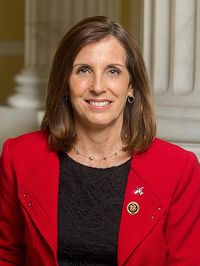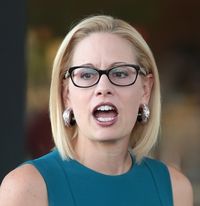United States Senate Election In Arizona, 2018
 From Conservapedia
From Conservapedia The 2018 United States Senate election in Arizona was a Senate election during the 2018 midterm elections held to fill the vacancy of Arizona's Class 1 Senate seat left upon the announced retirement of RINO Jeff Flake.
Contents
Seat vacated[edit]
Jeff Flake, the one-term globalist establishment RINO officeholder of the Class 1 Senate seat, announced in October 2017 that he wouldn't seek re-election.[1] Much was largely attributed to the surge of economic nationalism and movement conservatism during the Trump era, the then-senator's tanking statewide approval rating,[2] and the overall rejection of the ineffective leadership of establishment moderate Republicans upon the election of Donald Trump.
Republican primary[edit]
Republican candidates[edit]
Joe Arpaio[edit]
Joe Arpaio, the former sheriff of Maricopa County, announced his run in January 2018 for the Senate seat.[3]

Martha McSally[edit]
Martha McSally, the then-incumbent representative form Arizona's 2nd district, announced her run for the seat[4] after being touted by Mitch McConnell as a candidate.[5] A critic of Donald Trump for a while, McSally had opposed the president since the 2016 election and continued to maintain such for some time,[6] largely over the Access Hollywood tape initially as well as in regards to certain policies. Despite this, in addition to some on the right who assert her somewhat moderate House record to attack her for even being supposedly less conservative than Jeff Flake,[7] it is important to note that McSally has overall voted along with President Trump on almost all key issues.[8] Touted by the GOP establishment,[9] McSally's campaign still came under skepticism by some Arizona conservatives who viewed her as more of a moderate compared to her opponents Joe Arpaio and Kelli Ward.
Kelli Ward[edit]
Kelli Ward, the former state senator from Arizona's 5th upper legislative district, announced her bid for the Senate seat in late 2016[10] after failing to successfully primary challenge John McCain for the latter's seat then.[11] Backed by the movement conservative wing of the Republican Party, her bid was endorsed by Rand Paul,[12] Steve King,[13] and Paul Gosar.[14] In addition, Ward was the subject of a highly misleading attack ad by the GOP establishment, which made the supposition of her being a “chemtrails conspiracy theorist”.[15]
Republican primary results[edit]
Rep. McSally won the Republican primary held on August 28, 2018 with just over 50% of the vote.[16] This was largely attributed to Arpaio having siphoned off some of the strongly conservative vote away from Kelli Ward in the three-way race, thus indirectly helping McSally's campaign.
Democrat primary[edit]
Democrat candidates[edit]
Kyrsten Sinema[edit]
Kyrsten Sinema, the then-representative from Arizona's 9th congressional district, announced in late September 2017 her run for the Senate seat.[17] Sinema, a left-wing progressive who ran on a relatively moderate record in the U.S. House, has amounted a record of documented liberal bigotry, from partaking in an anti-war pagan rally[18] to asserting no problems in Americans joining the Taliban (something even CNN admitted was in context[19]), and from calling Arizona “the meth lab of democracy”[20] to asserting stay-at-home mothers as “leeches”.[21]
Deedra Abboud[edit]
Attorney and activist Deedra Abboud announced in April 2017 her run for the Senate seat.[22] A Muslim, her campaign was targeted with hate by extremists.[23]
Democrat primary results[edit]
Rep. Sinema easily won the Democrat primary held on August 28, 2018 with nearly 80% of the vote.[24]
General election[edit]
Debate[edit]
The debate for the Senate election was held on October 16, 2018.[25] In it, McSally largely touted her House record as a conservative, while Sinema asserted her record of bipartisanship.
Results[edit]
In an upset, Kyrsten Sinema won the general election over Martha McSally by a margin of less than 3% of the vote.[26] This was partially attributed to abandonment by some Arizona conservatives,[27] most of whom supported Kelli Ward in the primary but opposed McSally.
Election fraud?[edit]
Despite McSally having held a clear lead over Sinema by 16,000 votes on the election night,[28] after a high number of ballots were counted, most of which suspiciously turned out to be for Sinema, the latter was declared the winner. Some have pointed out the counter-intuitiveness of 300,000 votes that went for both Republican Doug Ducey (in the concurrent gubernatorial race) and Democrat Kyrsten Sinema,[29] while others such as Bill Mitchell have pointed out that even if McSally had not been sufficiently conservative, this should not have significantly contributed to her loss, as Arizona has long been known as a red state that elected moderates such as John McCain.[30]
Aftermath[edit]
Although having "lost" and conceded from the Senate race, McSally was appointed to Arizona's other Senate seat by Governor Doug Ducey,[31] succeeding the retiring Jon Kyl who was briefly appointed as an interim to fill the vacancy left upon the death of John McCain.
See also[edit]
References[edit]
- ↑ GOP Sen. Jeff Flake won't seek re-election in 2018
- ↑ Poll: Flake’s approval rating in Arizona at 18 percent
- ↑ Arpaio announces Arizona Senate bid
- ↑ McSally announces bid for Arizona Senate seat
- ↑ McConnell praises McSally as Senate candidate, despite lack of campaign
- ↑ McSally on Trump
- ↑ Martha McSally is Worse Than Jeff Flake
- ↑ Joe Arpaio and Kelli Ward Are Not ‘More Conservative’ Than Martha McSally
- ↑ Senate GOP campaign arm asking Trump to endorse McSally in Arizona: report
- ↑ Dr Kelli Ward enters 2018 US Senate race
- ↑ Arizona Primary Results 2016
- ↑ Rand Paul endorses Arizona's Kelli Ward
- ↑ Steve King Throws His Support Behind Arizona’s Kelli Ward
- ↑ Rep. Paul Gosar Endorses Kelli Ward for Senate Over ‘Never Trumper’ Martha McSally
- ↑ Senate Leadership Fund stated on August 22, 2017 in in an ad: Says Kelli Ward hosted a town hall on "chemtrail conspiracy theories" and is open to sponsoring chemtrails legislation.
- ↑ Arizona Primary Election Results 2018
- ↑ Rep. Kyrsten Sinema announces U.S. Senate run
- ↑ Emails: Kyrsten Sinema summoned witches to her anti-war rally
- ↑ CNN says Kyrsten Sinema's Taliban comments weren't taken out of context
- ↑ Kyrsten Sinema: "Arizona Is Clearly The Meth Lab Of Democracy”
- ↑ AZ Democrat Slams Stay-At-Home Moms: They're Nothing But Leeches (Warning: Quote within article contains foul language)
- ↑ Democrat Deedra Abboud announces U.S. Senate bid
- ↑ Roberts: Arizona Senate candidate under attack for being Muslim
- ↑ United States Senate election in Arizona (August 28, 2018 Democratic primary)
- ↑ Martha McSally and Kyrsten Sinema debate for U.S. Senate seat in Arizona (full debate)
- ↑ Arizona Senate Election Results 2018
- ↑ Mark Levin Says McSally Refused to Go on His Show, Didn’t Want to be Tied to Conservatives – Then Lost to a Marxist
- ↑ It Is Not Over, Arizona Election Results Being Audited For Election Fraud (Warning: Tweet within article contains foul language)
- ↑ https://twitter.com/udubfan13/status/1061142620804509696
- ↑ https://twitter.com/mitchellvii/status/1062334460253929472
- ↑ Rep. Martha McSally appointed by Arizona governor to Senate seat held by John McCain
Categories: [Arizona] [United States Politics] [United States Senate] [2010s]
↧ Download as ZWI file | Last modified: 02/03/2023 15:47:24 | 12 views
☰ Source: https://www.conservapedia.com/United_States_Senate_election_in_Arizona,_2018 | License: CC BY-SA 3.0
 ZWI signed:
ZWI signed:


 KSF
KSF